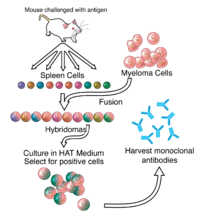
Photo from wikipedia
Amiodarone-induced thyrotoxicosis (AIT) is a potentially life-threatening condition, due to the coexistence of severe thyrotoxicosis (often requiring long courses of medical therapy to restore euthyroidism) and compromised heart function, resulting… Click to show full abstract
Amiodarone-induced thyrotoxicosis (AIT) is a potentially life-threatening condition, due to the coexistence of severe thyrotoxicosis (often requiring long courses of medical therapy to restore euthyroidism) and compromised heart function, resulting in high morbidity and mortality rates [1]. Total thyroidectomy has been recognized as beneficial over long-term medical therapies in the setting of moderate-tosevere left ventricular systolic dysfunction, especially when performed without delay [2–4]. SARS-CoV-2 (Covid-19) infection is associated with high rates of morbidity and mortality, especially in patients with cardiovascular comorbidities [5, 6], obesity [7], and diabetes mellitus [8]. The relationship between SARS-CoV-2 infection and the thyroid is ambiguous: on the one side, the development of subacute thyroiditis (SAT) following SARS-CoV-2 infection has been extensively reported [9]; on the other side, histopathological studies on deceased patients reported evidences of SARS-CoV-2 infection in most tissues but not in the thyroid samples [10]. Moreover, SARS-CoV-2 has not been researched on histological samples from destructive thyroiditis to date, since SAT is a benign and often selflimiting condition, which does not require a surgical management [11]. A 62-year-old man was admitted to our outpatient facility with a diagnosis of newly-onset AIT. His past medical history revealed overweight-obesity (age 30), arterial hypertension (age 47), and type 2 diabetes (age 51) treated with oral antidiabetic medications with inadequate glycemic control. The patient had a history of ST-elevated myocardial infarction (age 54) treated with percutaneous coronary intervention, and atrial fibrillation (AF, age 56). At 58, post-ischemic dilated cardiomyopathy with mild systolic dysfunction (left ventricular ejection fraction, LVEF, 46%) was diagnosed; in the same year amiodarone (200 mg/d) was started for the recurrence of AF with high ventricular drive, and an ICD was implanted. Two weeks before admission to our clinic the patient-reported tachycardia, sweating, weight loss (−7 Kg) and fatigue. Thyroid function tests showed FT4 44.3 pg/mL (7–17), FT3 9.27 pg/mL (2.7–5.7), TSH 0.01 μU/mL (0.4–4). Amiodarone was withdrawn before referral. Neck ultrasound showed a normal-sized (14.2 mL), disomogeneous and mildly hypoechoic thyroid gland, without nodules. Doppler sonography revealed absent vascularization, and radioactive iodine uptake with 131-I was low (3 h:0.9%; 24 h:1.1%). Cardiac evaluation identified an overall adequate hemodynamic compensation (NYHA-II); ECG confirmed the presence of AF (HR 90 bpm); ecocardiography showed dilated cardiomyopathy with a mild reduction of the LVEF compared to previous measurements (42%). Sotalol (160 mg/d in two doses) was started with a good control of HR. The patient received diagnosis of type 2 AIT, and oral methylprednisolone (40 mg/d) was started. After an initial drop of thyroid hormones concentrations (Fig. 1A), from week 4 the patient underwent a relapse of thyrotoxicosis with a significant worsening of symptoms, including tachycardia (HR 110 bpm) and mild dyspnea (NYHA-III). The patient was admitted to the inpatient ward after a * Fausto Bogazzi [email protected]
Journal Title: Endocrine
Year Published: 2022
Link to full text (if available)
Share on Social Media: Sign Up to like & get
recommendations!